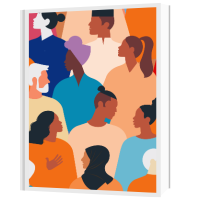Advocates, Activists, and Academics:
Meet the Contributors
Powerful Words, Profound Lessons:
Stories That will Stay With You
Chapter 1: Slavery and Race-Based Trauma – The Impact of Historical and Intergenerational Trauma on Health
Historical trauma is not just a relic of the past; it is a living, breathing force shaping the realities of Black communities today. The wounds of slavery did not end with emancipation, nor were they healed with the passage of civil rights legislation. Instead, they persist in the disproportionate rates of chronic illness, mental health struggles, and socioeconomic inequities that continue to impact Black Americans. Trauma does not simply vanish—it embeds itself in the DNA of generations, passed down not only through family stories and societal structures but through the very biology of our existence.
What does it mean to inherit trauma? It means that, from birth, Black individuals in America carry the psychological and physiological burden of enslavement, segregation, and systemic racism. Their bodies and minds are shaped by histories of oppression, histories that manifest in higher rates of hypertension, PTSD, and racial battle fatigue. The question is not whether these effects exist—the question is whether society will ever fully acknowledge them and take meaningful steps toward reparative justice.
Author: Carolyn Ross MD, MPH, CEDS-C
Chapter 5: Do You See Me or Am I Invisible? – An African American Female Physician Working in a White Male-Dominant Profession
Every day, I walk through the halls of the hospital knowing that my presence is both an anomaly and a threat. My credentials are questioned more than my white counterparts. My expertise is scrutinized in ways that theirs never are. Patients, assuming I am the nurse or the technician, look past me in search of the ‘real’ doctor. And when I speak with authority, I am often met with thinly veiled hostility—a resentment that whispers, ‘You should not be here’.
The weight of invisibility and hyper-visibility is crushing. I must be twice as good, twice as prepared, twice as measured in my responses, lest I confirm the biases that some already hold against me. And yet, despite all the barriers, I persist. Because if I do not, who will? If I allow the system to push me out, who will stand for the Black women who follow?
Author: Colleen P. Ramsey, MD
Chapter 9: How to Be an Anti-Ableist Clinician – Addressing Intersectionality of Race and Ability in Mental Health Care
For Black individuals living with disabilities, the struggle for recognition is twofold. They are often rendered invisible, their experiences erased by a society that prioritizes whiteness and able-bodiedness. Their pain is dismissed, their access to care obstructed, their needs deprioritized. The medical field, which should be a source of healing, often serves as yet another gatekeeper, another place where bias determines who receives compassion and who is left to suffer in silence.
Being an anti-ableist clinician means more than acknowledging disparities—it means actively dismantling the structures that perpetuate them. It means reexamining our definitions of ‘normal,’ challenging our diagnostic criteria, and recognizing the ways in which racism and ableism intersect to harm those most vulnerable. If we do not address these systemic failures, we are complicit in their continuation.
Author: Janelle A. Johnson, LMFT
Chapter 14: Food Justice – At the Intersection of Policy and Culture
Food injustice is antiblackness in practice. It is the deliberate construction of food deserts, the underfunding of community grocery stores, the predatory marketing of cheap, nutrient-poor food to Black and Brown communities. It is the reality that, in one of the wealthiest nations in the world, Black children are more likely to go to bed hungry than their white counterparts. And hunger is not just about food—it is about power, access, and systemic neglect.
True food justice means more than offering charity. It means restructuring the entire system, dismantling the corporate interests that profit off of food insecurity, and ensuring that Black communities have access to fresh, affordable, and culturally relevant foods. It is a fight not just for health, but for dignity and sovereignty over our own survival.
Author: Karen E. Watson
Chapter 16: Fighting for Our Place – Antiblackness in Academia
The university is often painted as a bastion of progressivism and intellectual enlightenment, yet it remains one of the most enduring strongholds of systemic racism. Black scholars, students, and faculty enter these spaces only to find themselves treated as outsiders—tokens of diversity rather than equal participants in the pursuit of knowledge.
To be Black in academia is to navigate a world that was not built for you. It is to endure the double standards, the microaggressions, the constant pressure to prove your worth. And it is to know that, despite your brilliance, despite your contributions, the institution will never fully claim you as its own.
Author: Chateé Omísadé Richardson, PhD
Chapter 19: The Impact of Systemic Racism on Mental Health Care
Black people seeking mental health care do not enter neutral spaces. They enter systems shaped by histories of medical racism, where their pain is minimized, their resilience is misinterpreted as a lack of suffering, and their symptoms are met with skepticism. They encounter practitioners who see their emotions as threats rather than cries for help.
If we are serious about mental health equity, we must stop pathologizing Black responses to oppression and start addressing the systems that produce trauma in the first place. We do not need more resilience training. We need an end to the structures that make resilience necessary.
Author: Delbert R. Wigfall, MD
Chapter 25: Authentic Allyship – A Call to Action
Allyship is not about good intentions. It is not about self-congratulation or performative gestures. It is about action, about stepping into discomfort, about leveraging privilege to dismantle the very systems that grant it. It is about making the conscious choice, every day, to stand in solidarity even when it is inconvenient, even when it costs something.
True allyship demands accountability. It is not enough to declare oneself an ally; one must prove it through sustained commitment, through self-education, through the willingness to listen, to learn, and, most importantly, to change. Anything less is complicity.
Author: Mazella Fuller, MSW, LCSW, CEDS
Chapter 33: White Fragility – A Prominent Barrier to Antiracist Progress
White fragility is not weakness—it is power wielded as defensiveness, as avoidance, as an excuse for inaction. It is the mechanism by which white individuals absolve themselves of responsibility, centering their discomfort over Black suffering.
If we are to move forward, we must confront this fragility head-on. We must ask white individuals not just to recognize their privilege, but to interrogate it, to challenge it, and to use it in service of dismantling the structures that uphold it.
Author: Anh-Thuy H. Le, PhD, LCP
Leaders in Equity, Advocates for Change:
Meet the Editors
The Inclusive Minds Podcast:
Listen In

All media inquiries or speaking and consultation requests should be submitted below

Antiblackness and the
Stories of Authentic Allies












